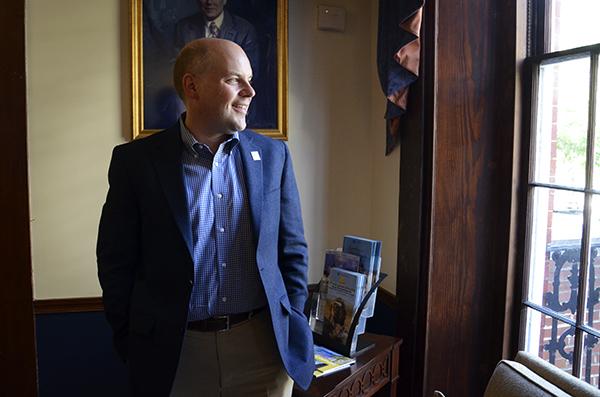The new head of the GW Alumni Association wants to keep its board members busy.
Alumni Association President Jeremy Gosbee said in an interview that the Alumni Association Board will develop a more formal process this year for connecting with alumni and will begin drafting resolutions to represent alumni — steps that will make the board more active and that, he says, will keep alumni more engaged long after they leave GW. And though it’s not the primary reason for the initiatives, experts say a more active board could lead to more alumni donations down the line.
“We’ve always had board members being ambassadors to alumni and sort of doing it ad hoc,” Gosbee said. “But this is the first time that we’ve said everyone’s going to have a certain amount of folks they reach out to and really have that certain objective that we’re all moving toward.”
The 72-member board could invite alumni to events on campus or pair them with students seeking career advice, Gosbee said. The board includes recent alumni who graduated last May and stretches back to alumni nearing their 50-year reunion.
“We definitely have the view that an engaged alumni community is a key piece of success of any university, and GW is no exception,” Gosbee said.
But the board won’t be directly asking alumni to make donations, because “alumni engagement isn’t just about writing checks,” Gosbee said.
“What I’d really rather see is somebody saying, ‘Would you come to an event? Would you be a part of this program?’ and see that relationship building over time to a point where, when the development team did approach them for a gift, they’re more ready to do that,” Gosbee said.
Still, experts say that connected alumni tend to be more likely to make gifts on their own. GW has historically had an alumni donation rate of roughly 10 percent, lower than its peers.
One way officials have tried to jump-start the giving process is through the Senior Class Gift Campaign in which seniors are encouraged to donate before they graduate. And for the first time this April, officials held a “Flag Day” fundraising blitz in which current students and young alumni were asked to make gifts.
James Walker, a 2007 alumnus and vice president for communications of the GW Alumni Association, said there aren’t any quotas for the number of alumni each board member needs to reach, but creating those relationships remains a priority.
“So many alumni are out there and want to connect, so we plan to focus more on highlighting opportunities to get reconnected with the University, other alumni and current students,” he said.
During alumni weekend, officials will hold nearly 50 events including welcome events from the deans of GW’s schools and tours of campus. Every year, officials also open Thurston Hall so alumni can revisit memories from their days in the residence hall.
Even though getting donations isn’t the main focus for GW’s alumni board, board members who have existing relationships with alumni can be the best bet when officials are trying to make a connection and land a gift, said Toby Egan, an associate professor of public policy at the University of Maryland.
A board member could contact their friends or former roommates, which in turn could help an institution keep track of alumni, he said.
Though GW’s largest-ever gift came in 2014 from a non-alumnus, many alumni have made some of the more recent large gifts. In May, 1986 alumnus Gilbert Cisneros donated $7 million to establish the Cisneros Leadership Institute, which creates programming for Hispanic students. And trustee and alumnus Mark Shenkman donated $5 million to career services in May 2014, renaming a residence hall in his honor.
Egan added that because board members will also remember being students at GW — experiences officials or fundraising staff may not have — they can exchange those stories and memories with other alumni in an attempt to bring potential donors closer to making a gift. And the more time alumni spend with current students, the more likely those alumni are to write a check, Egan said.
“They tend to think the University’s main purpose is to raise money from them,” Egan said. “The idea that you build relationships with alumni as community, as people who contribute, it’s a very good strategy.”
Morgan Corr, a 2007 GW alumnus and the secretary of the GW Alumni Association, said in an email that the board’s diversity, including social, racial, ethnic and gender differences, makes board members the right people to draw donations from all types of alumni.
“By having a board as diverse and multifaceted as GW, we are better leveraged to reach out and engage a wide array of alumni,” he said. “There’s an ever-growing list of alumni events and programs to help ensure there’s something of interest to just about every alum.”
And he said that finding out what clubs and organizations alumni joined when they were students is a great strategy to reconnect them to campus. He said his interest in LGBT resources at GW when he was a student carried over into his involvement as an alumnus.
“That led me to the Student‒Alumni Initiatives Committee and being involved in wider events to connect students and alumni,” he said. “By offering programs that hit on the interests and common experiences of alumni, we will be able to ‘meet them where they are’ and remind them that GW isn’t a three-, or four- or six-year journey, it’s a lifelong community.”
And for the first time this year, the Alumni Association Board will draft resolutions “on behalf of the alumni community,” Gosbee said, comparing it to Student Association resolutions.
He said the resolutions would likely be celebrating alumni accomplishments or honoring staff members. The idea for a resolution would come from board members, but alumni could weigh in, he said.
“If I, as a board member, am hearing a lot of alumni talking about a certain thing they do, we as an association want to speak out about that or be part of that discussion,” Gosbee said. “There are issues being discussed all the time on campus, and some of these issues certainly — not every one, but some of them — could potentially benefit from input from the alumni constituency.”
Colleen Murphy, Celine Bartels-Mills and Travis Hahn contributed reporting.







